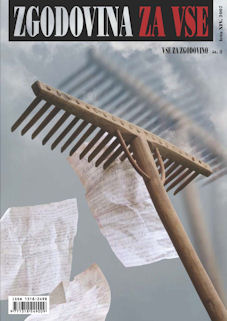BASHFULNESS AS A BULWARK AGAINST “IMPURITY” IN 19TH-CENTURY SOCIETY
Bashfulness was that inner sense that was supposed to enable each individual to meet the strict demands of morality. It was also the sense that should create a distance from “forbidden feelings”, the threshold at which man would start to feel discomfort and disgust. Bashfulness therefore had to ensure fear of God, of society and of other authorities.
What formed a heavy burden on the minds of Christian moralists in Slovenia was the fact that bashfulness was spread unevenly among people of different social strata and also that it was not mandatory. Ever greater circulation of modern-world conveniences, like, for example, increased mobility because of the railway, higher literacy and easier access to newspapers and literature, resulted in a general concern about the morals of the rural population.
An important turn in the public debate (or the lack thereof) about sexuality in Slovene newspapers is closely related to the strained relations between the two political parties. The liberals were particularly keen to attack the proverbial moral purity of the Catholic party and its members.
TO DEAR PATRIOTIC WOMEN
The time between 1835 and 1848 is one of the key periods in the history of Croatia. During that time a range of cultural and economic institutions were founded, which led to the integration of the highest social strata into the Croatian nation. The biggest battle was fought in the field of language. Because they raised children, women were considered as having the duty to teach children the national language. This period of national revival in Croatia was the time when women stepped from the domestic into the public sphere. Women began to engage actively in social and cultural life. They appeared more and more often with literary works, performed in theatre plays, thus spreading the Croatian language, and they participated eagerly in other efforts to spread the spirit of enlightenment and economic progress around the country. In this way they gained more opportunities for better education and various jobs outside the home. This was also the time when numerous women’s societies were founded for the first time in Croatia; women also joined a few men’s societies, in particular in the sphere of business. Although women were praised as the pride of the nation, very few documentary traces of them have been preserved in the historical memory.
WHOEVER COMES YOUR WAY SHOULD BEAT YOU, AND IF THEY CAN, SPIT IN YOUR FACE
Dragotin Dežman and Slovenian-ness
The predominant opinion in Slovenian historiography has it that Dragotin Dežman broke with Slovenian-ness for liberal reasons. The author thinks other reasons were decisive for his desertion – particularly his opposition to the (Yugo)slav orientation of Slovene politics. Until his death Dežman remained a sharp critic of Slovenians imitating the policy of the Czechs, and he believed political and cultural linkage with the Croats was a civilizational step backwards. His view was shared by many. The position on the Yugoslav question had considerable influence on the process of national differentiation of the citizenry.
HE DECLARED HIMSELF A GERMAN, ALTHOUGH HE HARDLY SPOKE ANY GERMAN
Language of communication as an element of manipulation in censuses 1880-1910 in Lower Styria
The author used newspaper reports to analyze censuses in Lower Styria between 1880 and 1910. He tried to present them in the light of the manipulations that were used in the interests of German (super)power. At the time of tense national relations the category language of communication served as a major source of an (apparent) rise in the numbers claiming German nationality in the Austrian half of the monarchy. The German side tried to present the towns (particularly) in Lower Styria as age-old German “fortresses”, while the Slovenes opposed that and insisted on a more objective picture. The statistical “growth” in the German population in Lower Styria was often affected by the political situation at the local level, where Germans could exert influence on census results by taking over municipal administration or by economic superiority (most apparently so at the last census in 1910).
THE STRUGGLE FOR BILINGUAL SIGNS IN ISTRIA IN 1894
The article deals with the violent demonstrations that took place in Istria in 1894. The demonstrations were organized against the decree of the Ministry of Justice that required all judicial districts with a mixed population of Slovenes, Croats and Italians to place bilingual signs on court houses. In Piran, the demonstrations were so serious that the military had to intervene. With the evident help of the municipal authorities, the Italian population of Istrian municipalities succeeded in their demand that the decree be repealed and the previous state of affairs be restored. The decree on bilingual signs remained in force only for the town of Piran.
“AWAY WITH ‘ŠMARNICA!'”
In the 1920s a stereotype developed in Slovenia about the poisonous and harmful wine ‘šmarnica’ . According to the stereotype ‘šmarnica’, because it contained methyl alcohol, caused madness, blindness, irrational behaviour, and aggressiveness. The stereotype was furthered and maintained particularly by articles in the winegrowing periodicals, and the authorities, too, joined the fight against ‘šmarnica’. In the 1920s the first measures and regulations were adopted to restrict the development and sale of ‘šmarnica’ and other native grapevine varieties and their wines. The authorities continued these activities until the beginning of World War II. Testimony to this are the minutes taken at the Dravska banovina province council meetings, which speak of long quarrels over what measures should be taken and whether they were needed in the first place. The representatives of the districts that produced the most ‘šmarnica’ initially opposed the provincial measures; however, they probably realized that the ‘ban’, who headed the province, was unrelenting in his decision. They eventually realized it was pointless to oppose the measures, and their opposition to them gradually diminished. The stereotype of the dangerous ‘šmarnica’ had thus successfully found support and became widespread. It was only later, when sample analyses showed that the wine ‘šmarnica’ contained only small quantities of methyl alcohol, that it became clear that the true danger in ‘šmarnica’ had a different origin. ‘Šmarnica’ was dangerous not because of the methyl alcohol, but because of the competition that this wine type represented for the quality types that found themselves in deep market crisis after the World War I.
HABSBURG OR HITLER
Confrontation of the Kingdom of Yugoslavia and the Czechoslovak Republic with the possibility of the restoration of the Hapsburgs in Vienna
The author analyzes the confrontation of the Kingdom of Yugoslavia and the Czechoslovak Republic with the possibility of the restoration of the Hapsburgs in Vienna in the 1930s. The article focuses particularly on the divergent positions in international politics in which both countries found themselves. This position conditioned different views in terms of both the alliances and political questions in the Danubian area, as well as the question of the future of Austria. The author arrives at the conclusion that the problem of Austria did put the Czechoslovak-Yugoslavian alliance to the test; however, he simultaneously emphasizes that the two countries remained unanimous on one point: the question of the restoration of the Hapsburgs. Both of them found unacceptable the scenario in which Otto would ascend the throne in Vienna.

